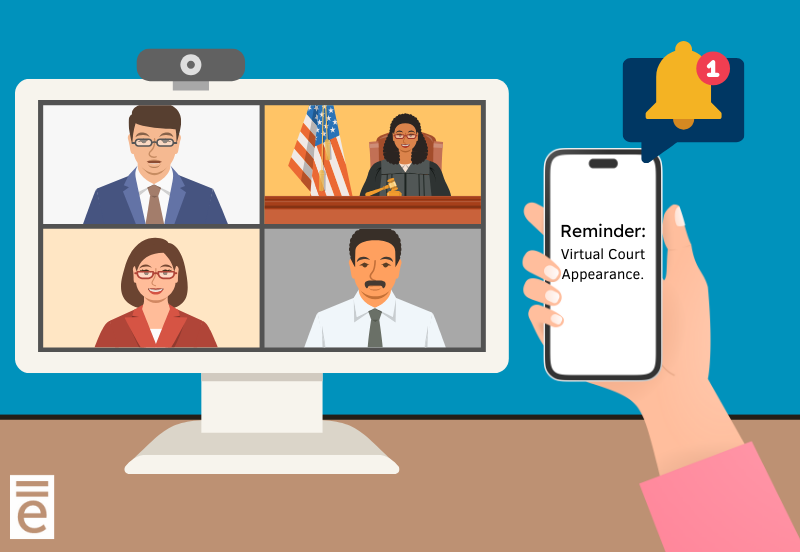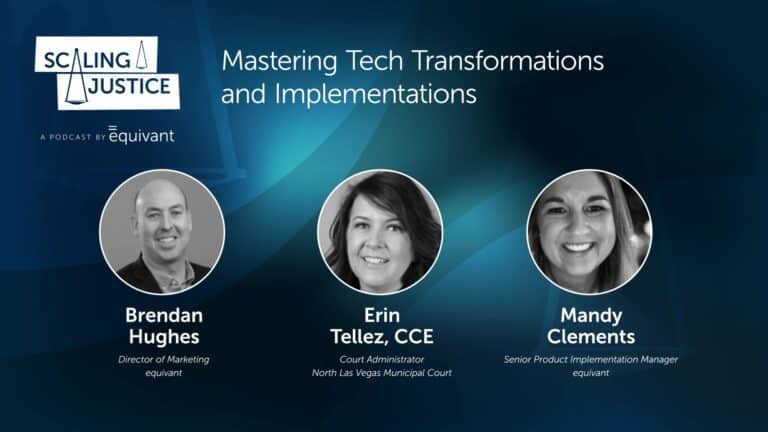People nationwide face consequences like incarceration and fines for missing a court date regularly. On top of that, a Failure to Appear (FTA) costs court systems time and money when they are already strapped for resources. It doesn’t have to be this way, though.
In many cases, the reason someone misses a court date is simply due to life’s obstacles like transportation, childcare, etc. Jennifer Pierce, a Senior Researcher at Vera (a national organization working to transform the criminal, legal, and immigration systems until they’re fair for all) said, “In practice, missing court is often not a deliberate failure or a deliberate choice. It’s because people are struggling with various other pressures.”
4 Principles that Help Community Members Meet Their Obligations
Now is the time for courts to address FTA rates and leverage technology to better meet the needs of community members. Recently, ideas42, a leading nonprofit behavioral science firm, published a report that presents four principles that courts can adopt to provide users with the support needed to meet their obligation to appear in court. The four principles were determined based on research into court appearance challenges and include:
- Making information clear, timely, and accessible
- Reducing logistical challenges
- Adding flexibility
- Providing useful resources for those who need them
The National Association for Court Managers (NACM) published an article where they shared four leading practices that support the principles outlined in ideas42’s report. The four practices included sending court date reminders, creating user-friendly court forms, allowing people to schedule their own appearances, and making virtual hearings a permanent option. The good news is that many courts can address these practices by leveraging their case management system. In this blog post, we outline how an equivant CMS can address each of these practices.
Send Automated Court Date Reminders
Courts that implement a reminder system are seeing higher appearance rates, more timely payments, improved caseflow, and better relationships with the communities they serve. A simple text reminder can go a long way. Fortunately, many case management system vendors offer some type of reminder system. At equivant, our automated reminder system provides cloud-based interactive text response systems for integrating reminders, notifications, and alerts with our suite of products.
One equivant client implemented Automated Reminders and has since reduced missed appearances by 7%, reducing the number of warrants issued and days in jail from FTA instances. This pragmatic approach to implementing text message reminders provides a small glimpse at the difference a reminder system can make.
Provide Court-Friendly Forms and eFiling
An article published by Vera highlighted why people miss court. One of the reasons was directly related to the complexity of some court forms. During a study, they found that a few simple fixes, such as moving the court date and location to the top of a form instead of the bottom, improved FTAs.
It’s common to see confusing court forms that use a lot of legal jargon. However, it’s important to make these forms accessible to everyone. If it’s not already a part of your regular processes, consider conducting form audits where you review all the forms your court uses while making sure that they are easily understandable and organized in a logical way. As an equivant client, if you are migrating or upgrading your CMS or implementing a CMS for the first time, we will work with you to review your forms and make sure they are ready and accessible.
In addition to providing user-friendly court forms, you can add to the level of accessibility by providing an eFiling option, allowing forms to be filed 24/7. Not only does eFiling add convenience and flexibility for the user, but it also helps the court by reducing paper dependency, processing time, data entry, and costs.
Allow People to Schedule Their Own Court Date with eScheduling
There is a lot of value in allowing people to schedule their own court dates. Tools like equivant’s eScheduling make it simple for a user to schedule their court appearance for a time that works for both them and the court. Additionally, courts can offer the ability to reschedule court dates. Life is crazy and sometimes things come up. Just as you would reschedule a dentist appointment due to a conflict, being able to reschedule a court date ensures people can appear in court at their scheduled hearing.
If your court is trying to decide whether or not to implement an eScheduling option, you’ll also want to consider what types of cases will be eligible. If you’re working with a technology vendor like equivant, we’ll work with you to configure the eScheduling application so that it meets your court’s business processes and rules.
Implement Virtual Hearings Using Online Dispute Resolution
When it comes to physically appearing in court, logistical challenges often get in the way for those who end up failing to appear. For some, it might mean they couldn’t afford to take the time off work. For others, it could mean they couldn’t arrange childcare or coordinate transportation. With the evolution of technology, though, it’s now possible to offer virtual hearings with solutions like Online Dispute Resolution.
ODR tools allow court-involved people to engage with your court differently, saving time and money for all involved. Additionally, these types of tools give people a forum in which to be heard while minimizing the complications and cost and reducing FTAs.
Technology is putting courts in a position to meet community members where they are and advance justice across the nation. If you’re interested in reducing FTAs and improving court accessibility within your community, contact us.





